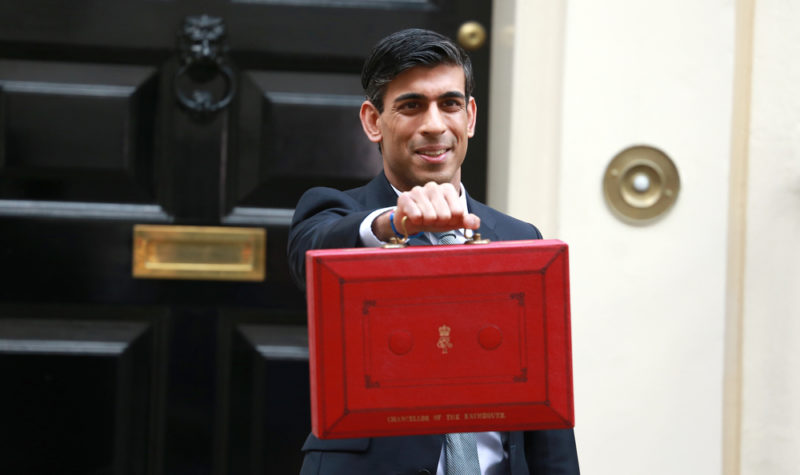The great virus spending spree and its implications

| Master Investor Magazine
Never miss an issue of Master Investor Magazine – sign-up now for free! |
Suddenly, once staid, unexcitable economists have become proponents of Modern Monetary Theory (MMT) and fiscal stimulus. The hum of helicopters scattering dosh from the sky is getting closer – with extraordinary consequences, writes Victor Hill.
Sometimes nothing happens in decades; and sometimes decades happen in weeks.
– Vladimir Ilyich Lenin (1870-1924)
Whatever it takes…
Many moons ago, you will recall, Mrs May was unable to find her magic money tree. But on Tuesday (17 March) Mr Sunak came across not just one, but a veritable forest of giant money trees which had been growing all along in the garden of Number 11 Downing Street. And he began to shake them with gay abandon. Just one long week ago I was writing about the £30 billion fiscal stimulus presented in Mr Sunak’s 11 March budget. Now that seems so last decade.
The unprecedented economic threat he faces is this. There are hundreds of thousands of small and medium-sized businesses – pubs, bars, coffee shops, restaurants, shops, boutique hotels – which will go out of business if the (partial) lockdown continues for more than a month or two. Unless they receive state-backed support, that is. They still have to pay their fixed costs – wages, rents and utility bills – even if their revenues are zero.
Once they go under they could not suddenly be conjured back into existence when the virus is quashed (whenever that might be). There would be literally millions of redundancies and thus unemployed people; and the demand-side shock to their suppliers would have a massive knock-on effect. The corporate tax-take would dwindle to all but nothing.
Essentially, on Tuesday, Mr Sunak beefed up the £12 billion anti-viral fiscal package presented on 11 March – to £32 billion. All retail, hospitality and leisure businesses in England are to be given a business rates holiday for a year. And most small businesses will be eligible for a cash grant of up to £25,000.
In addition, he offered a £330 billion Bank of England loan guarantee scheme so as to keep crippled businesses on (dare I say it?) a respirator. That’s about 15 percent of GDP. President Macron had put forward an equivalent €300 million scheme in France just the day before. The Spanish finance minister unveiled a €200 million package just hours before Mr Sunak’s performance and the Germans are working on a €550 billion one. Even Mr Trump is signing cheques. Fiscal stimulus is the new normal.
The lockdown also affects the supply-side of the economy at the same time as manufacturing winds down. In these extraordinary conditions the state is to become a kind of almighty insurance company, underwriting businesses until such time as things get back to something approaching normality. The details of how businesses can avail themselves of government guarantees on loans to pay salaries and so on are still sketchy; and it’s not clear what happens if banks refuse to advance those loans.
The loan guarantee fund represents a contingent liability on the government’s balance sheet. That is to say they will only result in increased national debt to the extent that borrowers default and the guarantees are triggered. But all the new spending commitments will be financed by new debt. The debt-to-GDP ratio is therefore set to rise – quite possibly significantly. But then, so will that of our principal trading partners and neighbours. And the effect of going from near-full employment to significant unemployment would have been a lot worse.
Airlines crash
Mr Sunak said that he would offer a support package for airlines “in the coming days”. Many commentators interpret that as a commitment to bail out the entire UK airlines industry – much as the banks were bailed out in 2008. Indeed, Grant Shapps, the Transport Secretary, hinted on Tuesday that airlines, rail and bus operators might be “temporarily” nationalised.
| Master Investor Magazine
Never miss an issue of Master Investor Magazine – sign-up now for free! |
Once nationalised, I suspect the airlines will remain in public ownership indefinitely – much as RBS (LON:RBS) has. Maybe we won’t need that third runway at Heathrow after all.
What about the workers?
There will be a mortgage holiday for victims of the virus. But, as Mr Corbyn has pointed out, that doesn’t help tenants who have been laid low by the virus with their rent – especially if they are self-employed. Yes, I’m a passionately pro-market Tory: but I’m acutely aware that there are people out there living from payday to payday with little or no reserves. Even Mr Trump (no pinko, he) plans to give $1,000 a month to affected workers.
What about the bankers?
It is useful to reflect why bank stocks have collapsed so much. I have warned over the last several years that commercial banking as a business model is in decline because there has been so much downward pressure on banks’ return on capital. But something else is afoot here. Barclays (LON:BARC) shares have gone in two weeks from £1.95 to £0.81. This is partly due to the market’s expectation of an imminent recession in which default rates will spike, resulting in higher loan losses for banks. The government’s loan guarantee scheme does not seem to have done much to allay those fears.
The tide is going out for capitalism
President Macron promises that no business whatsoever in France will go to the wall as a result of the pandemic. And in the UK, Boris-Rishi is promising something similar. That is probably a reasonable policy response given the unprecedented crisis. But in years to come, that policy might be seen as the moment capitalism began to die. If you can’t go bust there is no downside; and if there is no downside, there is no upside. So why should investors invest at all? This is not a new problem. In 2008-09 the US and the UK increased the level of moral hazard in the financial system by saving the banks. (Again, perhaps inevitably.)
In America, Mr Trump’s chances of securing re-election are falling by the day – even though his overwhelming likely adversary, Mr Biden (aka Sleepy Joe) is possibly the most uninspiring Democratic contender of my lifetime.
Mr Biden has pledged to appoint a woman as his Vice President. Great. But the real change is that even some right-leaning Americans who opposed socialised medicine have come to believe that the most expensive personal health insurance won’t protect them from a virus carried by people who have none. Republican Congressman Ted Yohodescribed coronavirus testing as follows: “You can look at it as socialised medicine – but in the face of a pandemic what are your options?”
Even more startling is that Bernie Sanders’ tame economist Stephanie Kelton is making the running. She is a proponent of Modern Monetary Theory (MMT) which holds that all you have to do to stimulate the economy is to print money and to drop it from helicopters (or, more probably, zap it into peoples’ bank accounts). This has already been tried in Hong Kong – with ambiguous results. A year ago that was considered weird; now even the Trump administration is considering it.
The fate of Sterling
On Wednesday the pound fell to a 35-year low against the US dollar, closing at $1.15. That is partly because there is normally a flight towards the dollar in a crisis. But the pound is also well down against the euro – trading at €1.08 as I write. It seems that investors are just taking refuge in cash – and even selling gold. The short-term outlook for sterling – the currency of an island fortress – is not bright.
Afterword: Bill Gates saw it coming
I strongly recommend readers to view a 2015 TED Talk by Microsoft (NASDAQ:MSFT) founder and former CEO Bill Gates. In this lecture, Mr Gates predicts precisely how a Covid-19-style pandemic could spread, causing millions of fatalities. Mr Gates foresaw that smartphone technology could be used to determine which citizens had been in contact with which carriers. The wily Koreans and Japanese were obviously listening hard; but sadly not the laggard Europeans.
This pandemic was NOT a Black Swan event – it was eminently predictable and indeed predicted. The problem is that healthcare systems, not least in the USA which spends more on medicine than any other nation, are essentially backward-looking rather than future-oriented. In the UK, Health Secretary Matt Hancock, has had an uphill struggle to convince the medical establishment of the efficacy of digital medicine. That task will now become pre-eminent. I see no reason why smartphones of the future might not be able to conduct real-time virus tests at minimal cost.
When this is over…
The future is going to be less globalised but more communitarian (not necessarily socialistic); less bureaucratic and more digital. The idea of a Universal Basic Income (which I have discussed in these pages numerous times over the years) has gone from being way-out to almost (but not quite) mainstream in a matter of weeks. I would be in favour of UBI so long as it supersedes the existing broken welfare model. Healthcare will have to be re-modelled to be more responsive to changing healthcare needs.
| Master Investor Magazine
Never miss an issue of Master Investor Magazine – sign-up now for free! |
The tax system will have to be re-fashioned to harvest more tax from those who can afford to pay it. (I’m advising all over-60s in my village to cancel their direct debits to the BBC.) That may entail a shift towards wealth taxes. Community support will become a civil norm: I’ve volunteered with my parish council as a community dog-walker – just in case any vulnerable self-isolators have cooped-up pooches. I’ll let you know how it goes.
Home-working will become standard – offices will become optional, with consequences for commercial property trusts. We shall fly much less. (I predicted last year here that we had nearly reached peak-aviation.) We shall remember how a little mindfulness helps with both gardening and work – and getting the balance right between the two. We shall be more self-empowered – not least over our own health. Tactile greetings – handshakes and social kissing – will die; but, hopefully, civility will recrudesce.
And, if we get it right, we shall be much better prepared for the next pandemic.

Government needs rethink its model – and can sack administers who then have to work!
Yes there should be a standard flat income for everyone over 18 – paid for by VAT
eg like the standard state pension with NO variation whatsoever !
I am not convinced about ANY company taxes nor any bailouts
Also get rid of all councils and planning permissions to make houses MUCH cheaper
Bin collection should be paid for by the government
Hmmmmm so some serious radical changes are afoot…..‘life but not as we know it Jim!’
some say Bill Gates saw it coming, others that he helped plan it!
a reliable way to predict the future.
You say you’re walking dogs – seems the virus came from another species, so what would stop the virus jumping across to dogs, cats, badgers etc?
Put a 1% tax on turnover of corps larger than say, 10m market cap.
And then 10% Corp tax on profits instead of 20%.
In the digital age, this is essential – too much govt inertia.